Actors such as Tom Hanks, Leonardo DiCaprio, and Gary Oldman have explored deep into method acting, risking their health for authenticity. From Hanks contracting a staph infection during 'Cast Away' to DiCaprio consuming raw bison for 'The Revenant,' these extreme measures toe the line between dedication and danger. Oldman's nicotine poisoning in 'Darkest Hour' and Sylvester Stallone's injury from Dolph Lundgren's punch exemplify the physical risks actors take. The unsettling acts, like Daniel Day-Lewis demanding to be spoon-fed and Jared Leto's unusual character gifts, highlight a commitment that blurs reality. The world of method acting offers depths worth uncovering.
Key Takeaways
- Actors risking health for roles, like extreme weight changes and dangerous dietary habits.
- Unscripted actions, like physical harm or discomfort, to enhance authenticity.
- Extreme method acting, such as full character immersion on and off set.
- Controversial approaches, like divisive character gifts and risky behavior.
- Discussions on the boundaries and impact of extreme method acting in the industry.
Tom Hanks: Cast Away Staph Infection
Tom Hanks contracted a staph infection during the filming of Cast Away due to his extreme method acting approach. Known for his dedication to roles, Hanks refused to cut his hair or bathe to authentically portray a castaway stranded on a deserted island.
This commitment led him to gain and lose 50 pounds for the film, showcasing his willingness to undergo physical transformations for his craft. Unfortunately, the unhygienic conditions he subjected himself to proved detrimental, resulting in a staph infection.
Despite the health risks, Hanks's dedication paid off as his performance garnered critical acclaim. The staph infection incident serves as a stark reminder of the lengths actors are willing to go to embody their characters realistically, even at the expense of their own well-being.
Hanks's unwavering commitment to his role in Cast Away not only left a lasting impression on audiences but also underscored the sacrifices actors sometimes make in pursuit of authenticity.
Leonardo DiCaprio: Raw Bison Consumption
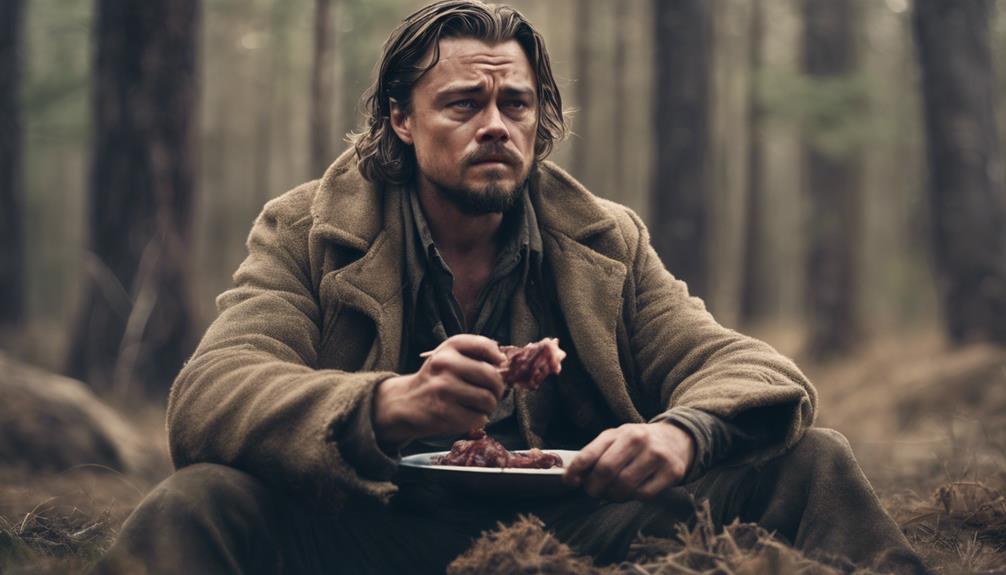
Leonardo DiCaprio's dedication to his craft reached new heights when he consumed raw bison liver for a scene in The Revenant, a remarkable feat considering his vegetarian lifestyle.
This extreme dietary commitment, although indicative of his method acting approach, raised concerns about potential health risks overlooked in the pursuit of authenticity.
The impact of such extreme measures on DiCaprio's performance in the film and the physical toll it took on his body remain topics of discussion within the domain of method acting.
Extreme Dietary Commitment
In his role for The Revenant, DiCaprio pushed the boundaries of realism by consuming raw bison liver despite being a vegetarian. His extreme dietary commitment showcased his dedication to method acting, as he sought to authentically portray the struggles of survival his character faced.
DiCaprio's decision to eat raw meat was a bold demonstration of his willingness to go to great lengths for the sake of his craft. By challenging his own dietary beliefs and venturing into unfamiliar territory, he highlighted his commitment to delivering a genuine and convincing performance.
The actor's choice to consume raw bison liver not only emphasized his method acting approach but also underscored the lengths he was willing to go to fully immerse himself in his character's experiences. DiCaprio's dedication to the role went beyond traditional acting methods, as he embraced the physical and mental challenges that came with such extreme dietary adjustments.
Health Concerns Overlooked
Health concerns were raised over Leonardo DiCaprio's consumption of raw bison liver during filming for The Revenant. DiCaprio's decision to eat raw liver for a scene in the movie sparked worries about actor safety and health implications. Given DiCaprio's vegetarian diet, consuming raw meat posed an even greater risk to his well-being. This extreme method of eating raw liver highlighted the lengths to which actors go for authenticity, often overlooking potential health hazards.
Health experts cautioned against consuming raw meat due to the risk of bacterial contamination and foodborne illnesses. The dangers associated with eating raw meat, particularly in unsanitary conditions, were emphasized in light of DiCaprio's actions. Actor safety should always be a priority on set, with proper measures taken to safeguard the well-being of the cast and crew.
Despite the dedication to his role, the potential health consequences of consuming raw bison liver shouldn't be overlooked in the pursuit of realism.
Impact on Performance
Consuming raw bison liver in The Revenant demonstrated Leonardo DiCaprio's commitment to authenticity in his performance. By delving into extreme method acting and consuming the raw organ, DiCaprio aimed to embody the arduous journey of his character, Hugh Glass, in the unforgiving wilderness. His decision to eat the raw liver wasn't taken lightly; it was a deliberate choice to enhance the realism of Glass's survival story. DiCaprio's dedication to the scene was palpable as he pushed himself beyond his comfort zone for the sake of the film.
This raw bison liver consumption not only showcased DiCaprio's commitment to his craft but also had a notable impact on his performance. The intense physical challenges he willingly undertook for the role added a layer of authenticity and grit to the film. Through his extreme method acting, DiCaprio's portrayal of Hugh Glass was elevated to a new level of realism, resonating with audiences and critics alike.
Gary Oldman: Nicotine Poisoning Incident
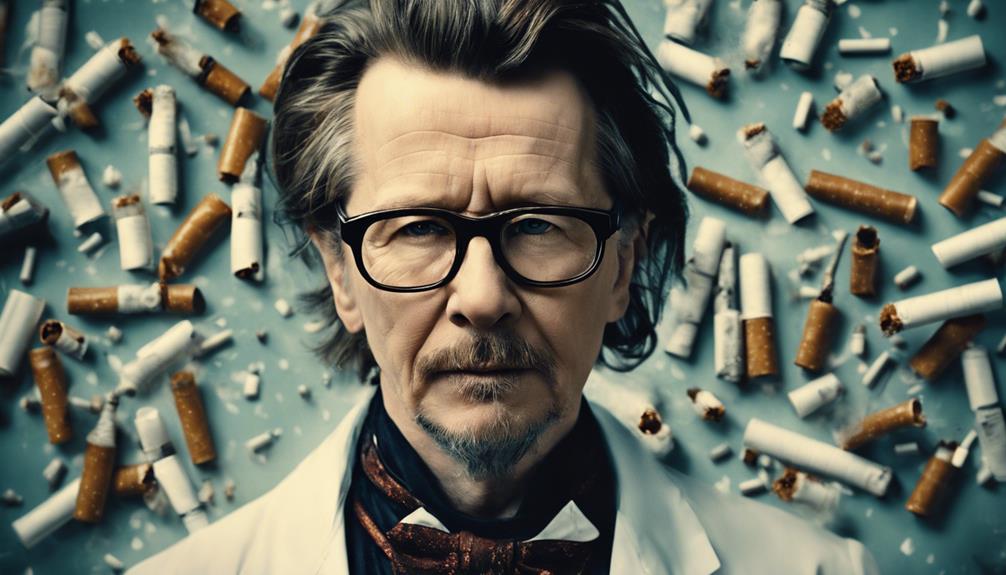
Gary Oldman's portrayal of Winston Churchill in 'Darkest Hour' was marred by a nicotine poisoning incident caused by his excessive smoking on set, reaching up to 400 cigars during filming.
His unwavering commitment to authenticity led to health issues that raised concerns among the cast and crew, highlighting the risks associated with extreme method acting approaches.
The incident underscores the importance of balancing dedication to a role with safeguarding one's well-being in the pursuit of artistic excellence.
Health Risks Ignored
Amidst his portrayal of Winston Churchill in Darkest Hour, Gary Oldman unknowingly subjected himself to nicotine poisoning by smoking an excessive 400 cigars.
Oldman's commitment to extreme method acting, in pursuit of authenticity, led him to disregard the potential health risks associated with such a drastic approach.
The actor's dedication to fully embodying the character of Churchill resulted in him experiencing symptoms of nicotine poisoning, highlighting the significant dangers of pushing the boundaries of method acting too far.
Extreme Dedication Misjudged
Oldman's relentless pursuit of embodying Winston Churchill through intense method acting resulted in him suffering nicotine poisoning from smoking an excessive 400 cigars for his role in Darkest Hour.
In his exploration of the character of Churchill, Gary Oldman delved deep into the character of Churchill, wearing 14 pounds of prosthetics and immersing himself in the iconic figure's habits, including his fondness for cigars. However, the actor's dedication to his craft took a toll on his health, as the constant smoking led to nicotine poisoning, showcasing the risks associated with extreme method acting practices.
Oldman's commitment to portraying Churchill with such intensity not only highlighted his professionalism but also raised concerns about the physical and mental health implications of pushing the boundaries of method acting. This incident serves as a cautionary tale, emphasizing the importance of balancing dedication to a role with safeguarding one's well-being in the demanding world of acting.
Sylvester Stallone: Dolph Lundgren Punch

Sylvester Stallone's dedication to realism in Rocky IV led to Dolph Lundgren punching him, resulting in Stallone spending nine days in the ICU with a swollen heart.
In a quest for authenticity, Stallone, who portrayed the iconic character Rocky Balboa, decided to elevate the intensity of a scene where Lundgren's character, Ivan Drago, delivers a brutal blow to Rocky. Encouraging Lundgren to hit him for real seemed like a bold move to heighten the drama on screen. However, the punch landed with unexpected force, causing Stallone serious harm.
The impact left Stallone hospitalized for over a week, highlighting the extreme lengths some actors go to for their craft. This incident shed light on the dangers and risks associated with method acting, where the line between performance and reality can blur, leading to unintended consequences.
Stallone's commitment to his role as Rocky Balboa ultimately came at a high price, underscoring the fine balance actors must navigate between authenticity and personal safety on set.
Daniel Day-Lewis: Spoon-fed in Wheelchair
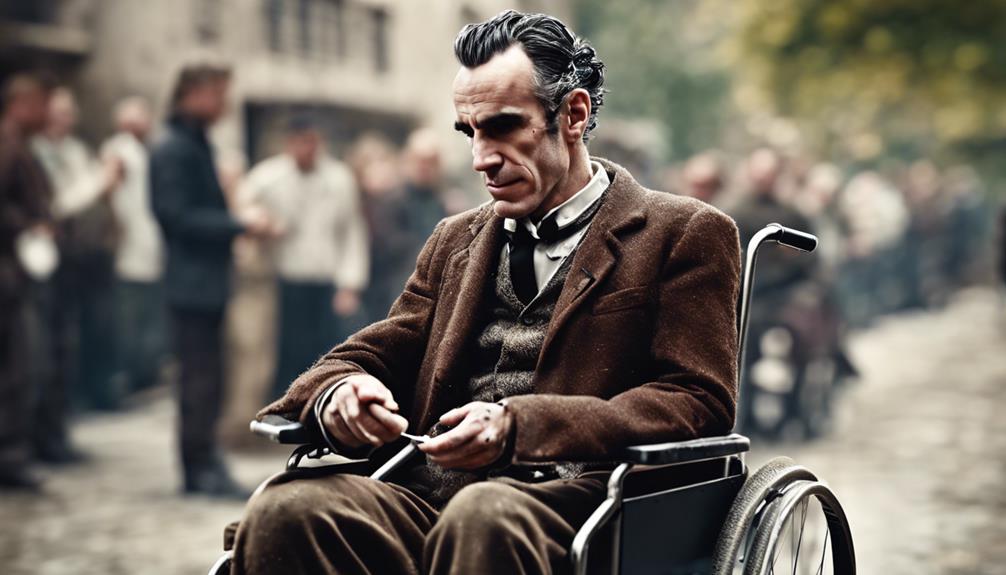
Daniel Day-Lewis's commitment to authenticity in his role for 'My Left Foot' extended to demanding to be spoon-fed in a wheelchair, showcasing his extreme method acting techniques. Known for his dedication to fully immersing himself in his characters, Day-Lewis took on the challenge of portraying the real-life artist and writer Christy Brown, who'd cerebral palsy. His decision to be spoon-fed in a wheelchair was part of his rigorous preparation to accurately depict Brown's daily struggles and challenges.
Day-Lewis's method acting approach went beyond the physical demands of the role. He stayed in character both on and off set, further blurring the lines between himself and the character he was portraying.
This intense commitment to authenticity not only impressed audiences and critics but also earned him an Academy Award for Best Actor for his outstanding performance in 'My Left Foot.' Day-Lewis's dedication to his craft and his willingness to push the boundaries of method acting set a high standard in the industry.
Dustin Hoffman: Unscripted Slap Incident

In an unscripted moment on set, Dustin Hoffman delivered a slap to Meryl Streep during filming, sparking tension and controversy. The incident, rooted in Hoffman's method acting approach, aimed to inject authenticity into the scene. However, the slap wasn't planned, catching Streep off guard and eliciting a genuine reaction from her.
Hoffman's commitment to realism blurred the lines between acting and reality, leading to a controversial moment that raised ethical concerns on set.
The unscripted slap incident highlighted Hoffman's dedication to his craft, showcasing his willingness to go to extreme lengths for a convincing performance. While method acting is known for pushing actors to embody their characters fully, this incident underscored the potential risks and boundaries that can be crossed in pursuit of authenticity.
The tension that arose from the unscripted slap revealed the complexities of negotiating the fine line between immersing oneself in a role and respecting personal boundaries on set.
Adrien Brody: Possession Sacrifice
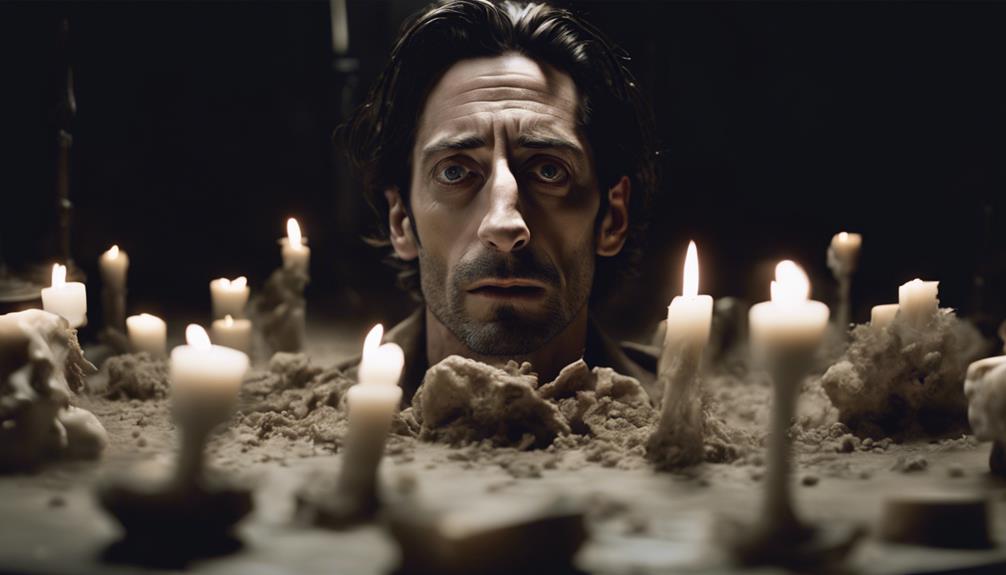
Brody's profound method acting commitment for The Pianist included sacrificing his possessions to fully embody the role of a Holocaust survivor. This extreme dedication to his craft saw Adrien Brody selling off personal belongings, such as his apartment and most of his possessions, as part of his preparation for the role.
The sacrifice of possessions showcased Brody's deep commitment to portraying a Holocaust survivor authentically, emphasizing the intensity of his method acting approach. By relinquishing material possessions, Brody demonstrated a level of commitment and sacrifice rarely seen in method acting.
This extreme measure taken by Adrien Brody highlights the lengths some actors are willing to go to in order to fully immerse themselves in their characters and deliver a truly authentic performance.
Jim Carrey: Erratic Behavior on Set
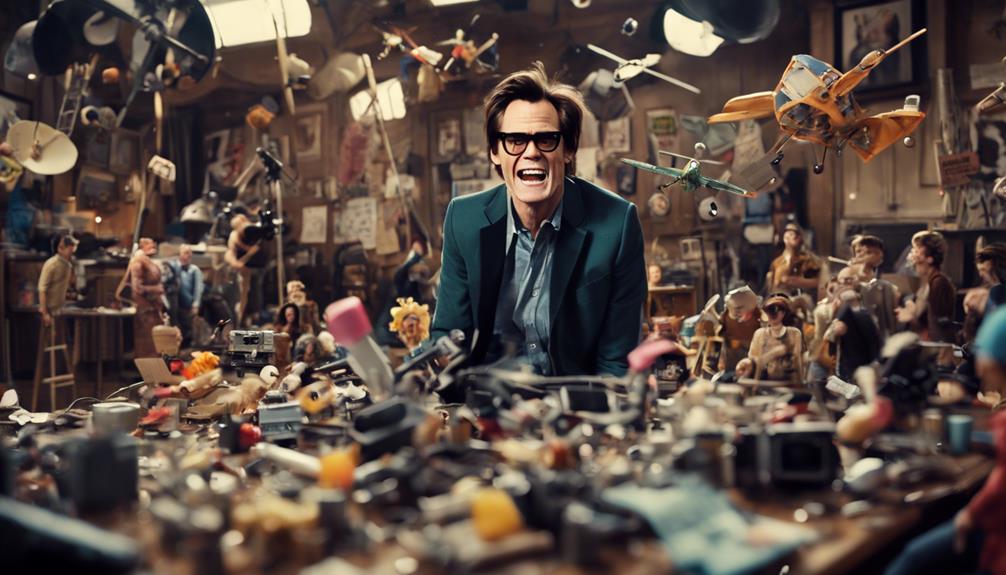
Jim Carrey's method acting as Andy Kaufman in 'Man on the Moon' led to his erratic behavior on set, including demanding to be addressed as Andy both on and off-camera.
This intense character transformation not only affected Carrey but also had a significant impact on the filming crew, causing tension and conflicts throughout the production process.
Carrey's Intense Character Transformation
During filming of 'Man on the Moon,' Carrey's intense character transformation as Andy Kaufman led to concerns among the cast and crew due to his erratic behavior on set. Carrey's commitment to method acting blurred the boundaries between his real identity and the character he portrayed, resulting in an immersive performance that left many questioning where Andy Kaufman ended, and Jim Carrey began.
Carrey insisted on being referred to as Andy both on and off-camera, reinforcing his dedication to fully embodying Kaufman's persona.
Carrey's erratic behavior extended beyond filming, as he continued to stay in character as Andy Kaufman even during breaks, meals, and interactions with the crew.
The intensity of Carrey's method acting as Kaufman raised eyebrows on set, with some expressing concerns about the toll it was taking on the actor's mental and emotional well-being.
Carrey's thorough exploration of Andy Kaufman's world showcased the lengths some actors go to deliver a truly authentic performance, even at the risk of their own stability.
Impact on Filming Crew
The filming crew experienced tension and confusion due to Jim Carrey's erratic behavior on set while portraying Andy Kaufman in 'Man on the Moon.' Carrey's commitment to immersive method acting, where he demanded to be called Andy and stayed in character both on and off camera, created a challenging environment for those working on the film.
The boundaries between Carrey's real persona and the character of Andy Kaufman became increasingly blurred, causing discomfort and uncertainty among the crew and cast members. His intense dedication to the role not only influenced the dynamics on set but also raised important questions about the limits of method acting in the film industry.
Despite Carrey's efforts to fully embody Kaufman's persona, his approach had a significant impact on the filming process, highlighting the complexities and potential drawbacks of pushing the boundaries of method acting in a professional setting.
Shia LaBeouf: Moonshine Consumption
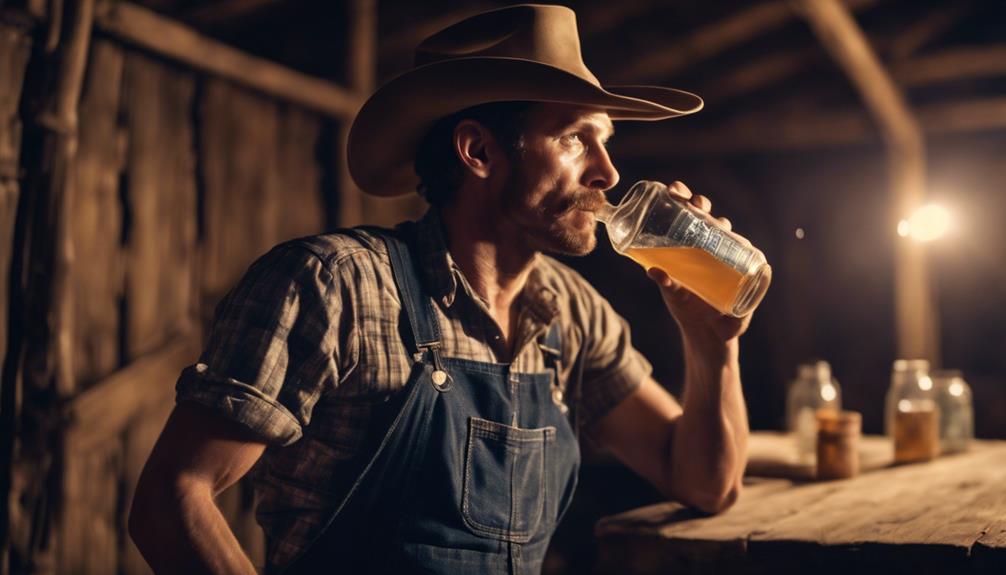
Consuming moonshine to enhance his performance in the film Fury, Shia LaBeouf took method acting to extreme lengths by remaining intoxicated for authenticity as a WWII soldier. This dedication to his craft showcased LaBeouf's commitment to portraying his character's experiences realistically.
- LaBeouf's extreme method involved staying in character through alcohol consumption.
- His dedication to realism led him to take drastic measures for his role.
- LaBeouf's commitment to portraying his character's experiences involved extreme actions.
While some praised his commitment to the role, others questioned the necessity of such extreme actions. The use of moonshine to embody the essence of a WWII soldier raised concerns about the potential risks and impact on his well-being. Despite the controversy surrounding his approach, Shia LaBeouf's willingness to go to great lengths for his craft remains a topic of discussion in the field of method acting.
Nicolas Cage: Tooth Extraction Without Anesthesia
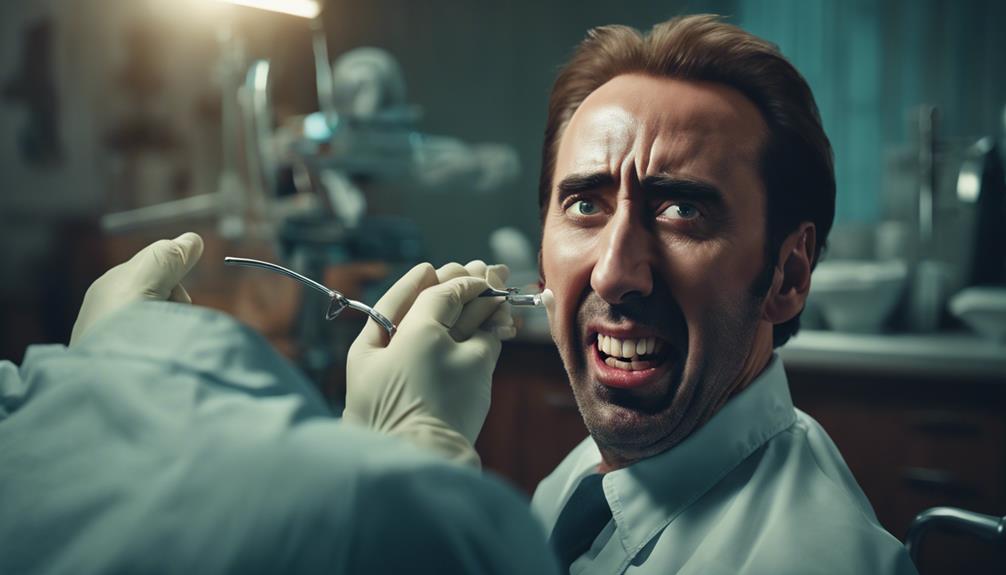
Nicolas Cage's commitment to method acting reached a new level when he opted to have four teeth pulled out without anesthesia for his role in the film Birdy. This extreme decision showcased not only his extreme pain tolerance but also his unconventional approach to embodying a character.
Cage's dedication to his craft, demonstrated through such extreme measures, highlights the lengths some actors are willing to go in order to deliver authentic and compelling performances.
Extreme Pain Tolerance
Demonstrating unparalleled commitment to his craft, actor Nicolas Cage underwent a tooth extraction without anesthesia as part of his extreme method acting approach for the film Birdy. This extreme method acting decision showcased Cage's high pain tolerance and commitment to authenticity.
The tooth extraction scene wasn't only a physical challenge but also a mental and emotional proof for Cage, who aimed to fully immerse himself in his character. Cage had four teeth pulled without anesthesia for his role in Birdy. Cage's extreme method acting involved enduring the tooth extraction to enhance his character portrayal. The tooth extraction scene was a confirmation of Cage's high pain tolerance and commitment to authenticity.
Cage's willingness to endure such intense physical discomfort exemplifies his dedication to his craft and willingness to go to great lengths to deliver a convincing performance.
Unconventional Acting Methods
Undergoing a tooth extraction without anesthesia for his role in Birdy, Nicolas Cage displayed an extreme level of commitment to his craft through unconventional method acting.
In preparation for a scene that required authenticity, Cage opted to have four teeth pulled without the comfort of anesthesia, showcasing his extreme dedication to method acting. This decision led to a physically painful experience that Cage willingly endured to accurately portray his character.
The tooth extraction scene in Birdy demanded a physically demanding and uncomfortable process from Cage, emphasizing his commitment to realism and the depth of his character portrayal.
Dedicated Commitment to Role
Demonstrating unparalleled commitment to his role, Nicolas Cage underwent a tooth extraction without anesthesia for the film Birdy. This extreme commitment to method acting led Cage to have four teeth pulled out to enhance the authenticity of his character on screen.
The painful dental procedure was a reflection of Cage's dedication to his craft, showcasing his willingness to endure discomfort in pursuit of his art. This intense method acting choice by Nicolas Cage is a notable example of going to extreme lengths for a role, illustrating the lengths some actors are willing to go to in order to fully embody their characters and bring their performances to life.
Cage's decision to undergo such a physically demanding and painful process highlights the dedication and passion he has for his work, setting a high standard for method acting in the industry.
Christian Bale: Drastic Weight Loss
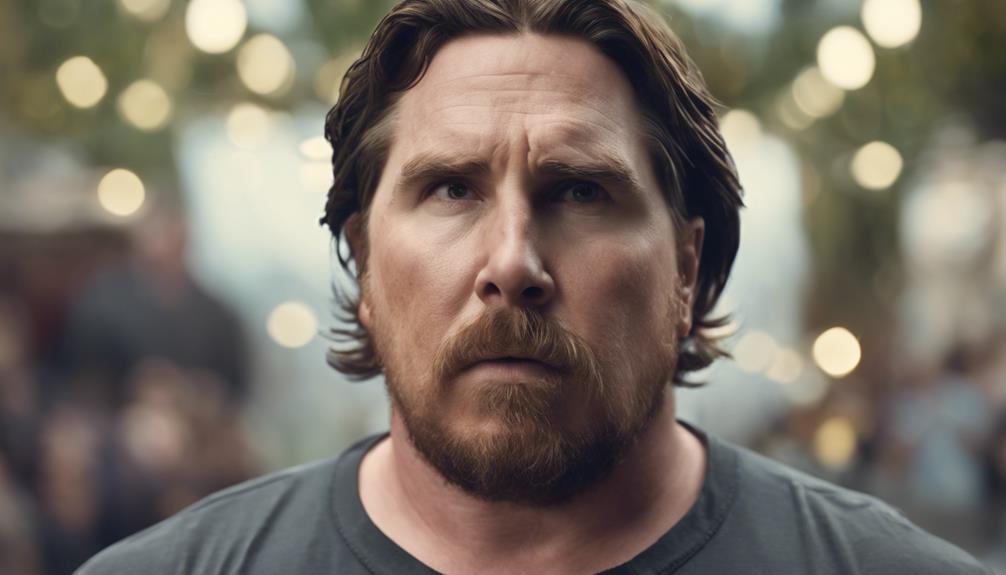
Christian Bale drastically reduced his weight by 62 pounds for his role in 'The Machinist,' alarming audiences with his skeletal appearance. The actor's commitment to method acting pushed him to extreme measures, undertaking a drastic transformation that involved a diet regimen consisting of only apples and a cup of coffee each day.
Bale's physical appearance in the film shocked viewers and sparked concerns about his well-being, as his weight loss reached dangerously low levels. While his dedication to the role earned him critical acclaim for his performance, it also raised questions about the toll such extreme methods took on his health.
Bale's willingness to go to such lengths demonstrates the lengths some actors are willing to go to embody their characters authentically. However, the risks associated with such drastic weight loss highlight the fine line between dedication to a role and potential harm to one's own body.
Jared Leto: Joker Character Gifts
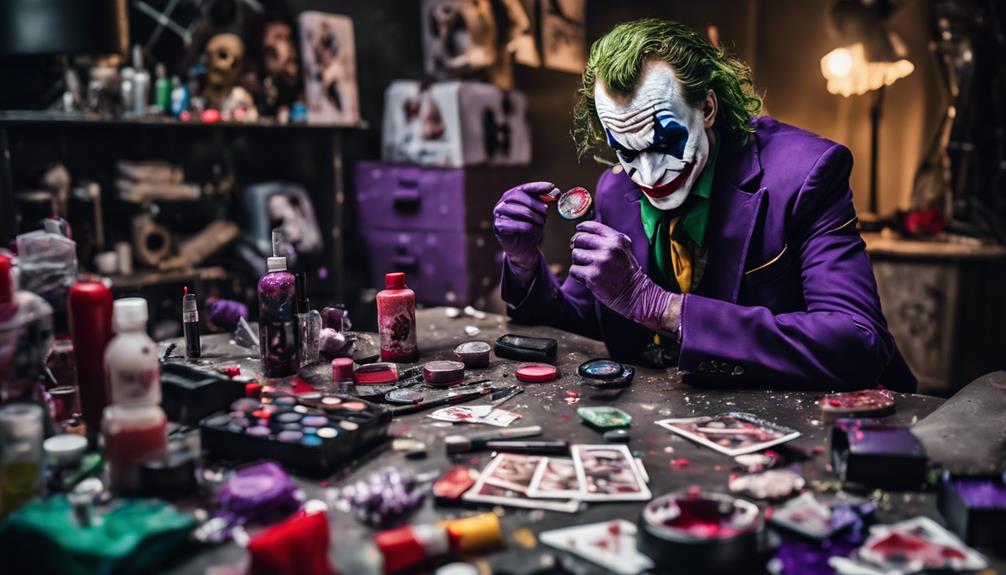
Jared Leto shocked his co-stars by sending unconventional gifts like a black rat and used condoms while fully immersing himself in the role of the Joker in Suicide Squad. His extreme approach to method acting raised eyebrows and sparked discussions about the boundaries of the craft.
Leto's method acting: Immersing himself in the role of the Joker, Leto went to great lengths to stay in character, even when off set.
Unconventional gifts: The actor's choice to send unsettling gifts like a black rat and used condoms to his co-stars left many puzzled and uncomfortable.
Impact on the cast and crew: Leto's commitment to his craft led to divisive reactions, with some applauding his dedication while others questioned the ethics of his extreme methods.
Robert De Niro: Teeth Grinding
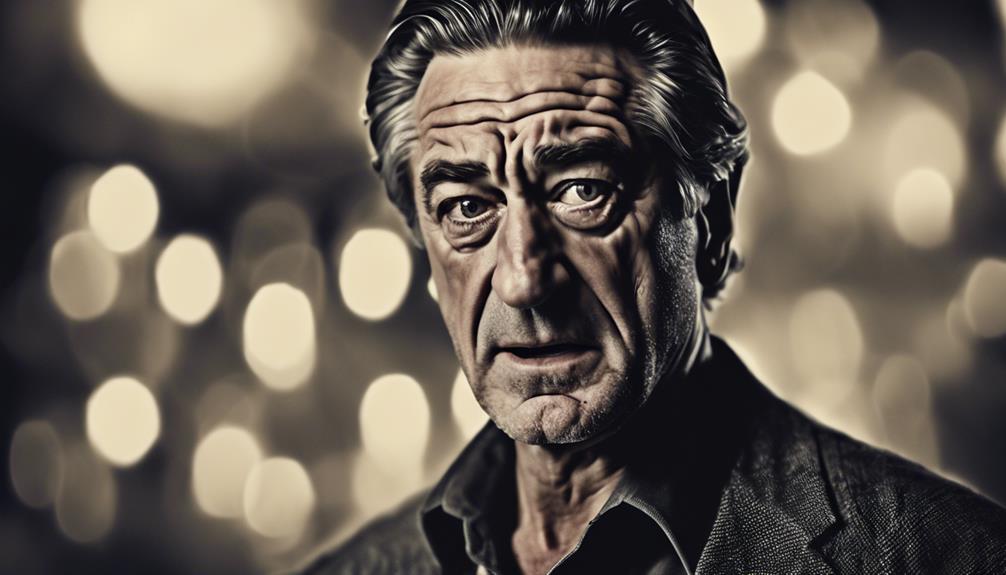
Robert De Niro demonstrated his commitment to authenticity by grinding down his teeth for his role in Cape Fear. Known for his dedication to method acting, De Niro went to extreme lengths to accurately portray the menacing character he was tasked with bringing to life on screen.
The decision to alter his physical appearance by grinding his teeth showcases the actor's intense commitment to his craft and his willingness to undergo significant transformations for his roles. By taking on the challenging task of teeth grinding for Cape Fear, De Niro exemplified the lengths to which some actors are willing to go in order to fully immerse themselves in their characters.
This extreme method acting approach not only highlights De Niro's dedication to authenticity but also underscores the depth of his commitment to delivering powerful and believable performances that leave a lasting impact on audiences.
Jamie Foxx: Eyelids Glued Shut
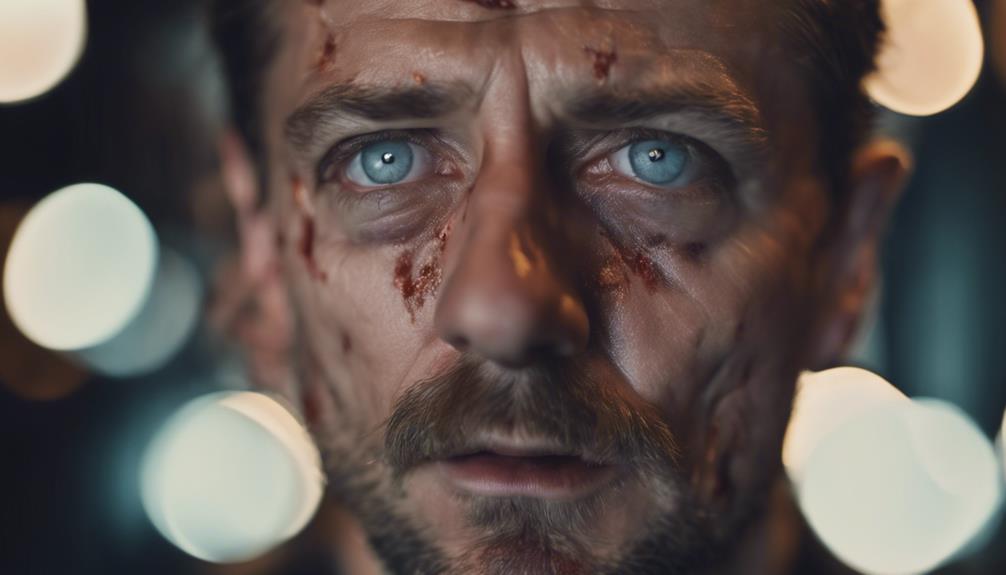
With unwavering commitment to his role, Jamie Foxx had his eyelids glued shut for over 14 hours daily to portray a blind musician in the film Ray. This extreme method acting technique was a challenging choice that pushed Foxx to the limits of his dedication to authenticity.
The prosthetic eyelids not only physically obstructed his vision but also triggered panic attacks, demonstrating the toll this method took on him during filming. Despite the discomfort and challenges faced, Foxx persisted in his pursuit of realism, utilizing glued eyelids as a tool to fully immerse himself in the character and bring the blind musician portrayal to life on screen.
Foxx endured over 14 hours daily with glued eyelids to stay in character for Ray. The prosthetic eyelids caused him to experience panic attacks, showcasing the intensity of his method acting. Foxx's commitment to authenticity and willingness to undergo physical discomfort contributed to his award-winning performance in Ray.
Aaron Eckhart: Fake Child Loss

Immersing himself in the emotional trauma of losing a child, Aaron Eckhart simulated the experience in a support group for his role in 'Rabbit Hole.'
Eckhart, known for his dedication to method acting, delved deep into the psyche of a grieving parent to authentically portray the complexities of loss on screen. His commitment to his craft led him to replicate the profound sorrow of losing a child, a challenging and emotionally taxing endeavor that showcased his willingness to push boundaries for a role.
By immersing himself in the depths of grief, Eckhart aimed to bring a raw and realistic portrayal to his character, emphasizing the emotional turmoil that accompanies such a devastating experience.
While his method acting approach raised eyebrows and sparked discussions about the lengths actors go to for authenticity, it also shed light on the intense preparation and emotional investment that can define a performance in the world of cinema.
Frequently Asked Questions
Who Took Method Acting Too Far?
In some instances, actors push boundaries of method acting beyond expectations, blurring lines between performance and reality. The intense dedication to their craft sometimes leads them to extreme measures, challenging their mental and physical limits.
What Is Problematic About Method Acting?
Method acting can blur the lines between reality and fiction, impacting mental well-being. It can lead to health risks, create tension on set, overshadow performances, and be seen as self-indulgent. Finding a balance is essential.
What Are the Negative Effects of Method Acting?
Method acting can lead to physical health issues like infections, pneumonia, and dental problems. Actors may experience mental strain, panic attacks, and emotional distress from extreme method acting. Some behaviors can cross ethical boundaries and cause discomfort for co-stars and crew.
Why Are People Against Method Acting?
People are against method acting because they fear its impact on actors' well-being. The intensity can overshadow talent, disrupt sets, and strain relationships. Critics question if extreme methods are truly necessary for great performances, sparking ongoing debates in the industry.
Conclusion
To sum up, method acting can sometimes push actors to extreme lengths in order to fully embody their characters. While dedication to their craft is commendable, there are certainly instances where the line between reality and fiction becomes blurred.
It's important for actors to prioritize their health and well-being above all else, even if it means stepping back from a role that may be taking a toll on them. After all, a performance isn't worth sacrificing one's own health and safety.








